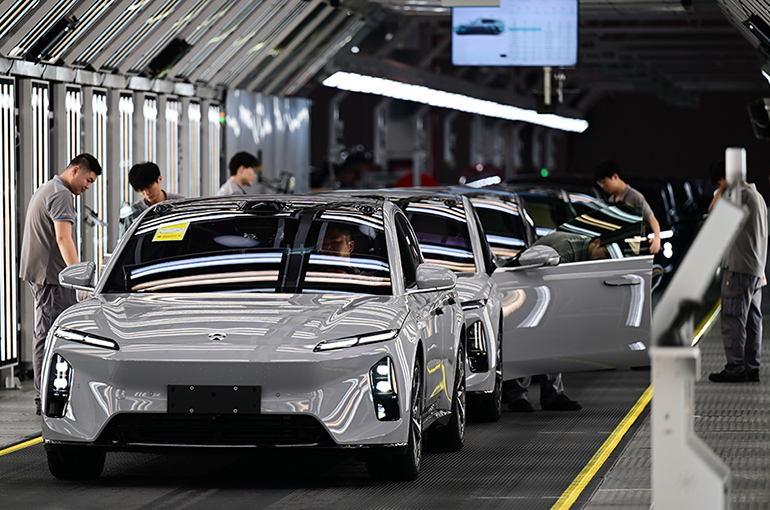 China Reclaims Title as Global Auto Industry Leader Driven by Electrification, Self-Driving Tech, Report Says
China Reclaims Title as Global Auto Industry Leader Driven by Electrification, Self-Driving Tech, Report Says(Yicai) Nov. 25 -- China has regained its crown as the top market in the global automotive industry thanks to its world-leading electrification push and autonomous driving technologies, according to the findings of a recent survey.
China led with 87 points out of 130, followed by South Korea with 83 and the Netherlands with 78, according to consultancy Roland Berger's 14th Automotive Disruption Radar biannual analysis of customer interest, regulation, technology, infrastructure, and industry activity based on a survey with 22,000 car users across 22 countries. Singapore, which ranked first over the previous two editions, dropped out of the top three for the first time since 2021.
The 14h Automotive Disruption Radar, released in Chinese yesterday after first being published in September, analyzes market trends related to disruption in the global auto industry. Other monitored markets include France, Germany, Japan, and the United States, with information also drawn from leading experts, major industry reports, and other external sources.
"China has rapidly opened up a gap with other regions in key dimensions, including electric vehicles market share, charging infrastructure, and artificial intelligence-driven driver assistance systems," said Zheng Yun, a senior partner and Asia head of auto practice at Roland Berger. "Chinese original equipment manufacturers' development cycles are 24 to 40 months, roughly half the 48 to 60 months required by European peers."
The commanding performance of China stems from its strength in technology and infrastructure, with battery EVs accounting for 25 percent of car sales in the country, up from 22 percent in the report's 13th edition, while the rate in Europe has stagnated at 12 percent. Around 95 percent of Chinese respondents said they would consider buying an EV as their next car, the highest rate worldwide.
The US fell to 14th position in the latest ranking, reflecting shrinking consumer interest in new mobility concepts and shared services. The report identifies a growing preference for private vehicle ownership across mature markets, including the US, Germany, Japan, and China.
OEMs in Europe face mounting pressure due to Chinese brands such as BYD, Nio, and MG Motor gaining market share. In response, European carmakers are forming joint ventures with Chinese partners, including Volkswagen Group with Xpeng Motors, Audi with SAIC Motor, and Mercedes-Benz with Automobile Holdings, though often ceding development leadership.
Four Distinct Ecosystems Emerge
Roland Berger's latest report highlights the emergence of four decoupled regional automotive ecosystems: the US, Europe, China, and Japan/South Korea, each developing differently due to varying policies, technical standards, and consumer preferences.
"We see widening gaps between regions, especially in software, standards, and new vehicle development speed, alongside diverging consumer expectations," said Shi Shuai, a partner at Roland Berger. "OEMs' future development will depend on their ability to combine strategic alliances, software expertise, and adaptation to market fragmentation."
The fragmentation requires manufacturers to maintain dual technology stacks: one for China, another for other markets, particularly in software, cybersecurity, and data services. The country's distinct digital ecosystem, built around internet giants Baidu, Alibaba Group, Tencent Holdings, and Huawei Technologies, creates unique middleware and operating system requirements separate from Western auto platforms based on Android.
Despite fragmentation, complete global decoupling remains unlikely due to economic pressures, with the industry converging on fundamental technical systems such as centralized computing architectures and cellular vehicle-to-everything communication standards, the report said.
Editor: Martin Kadiev